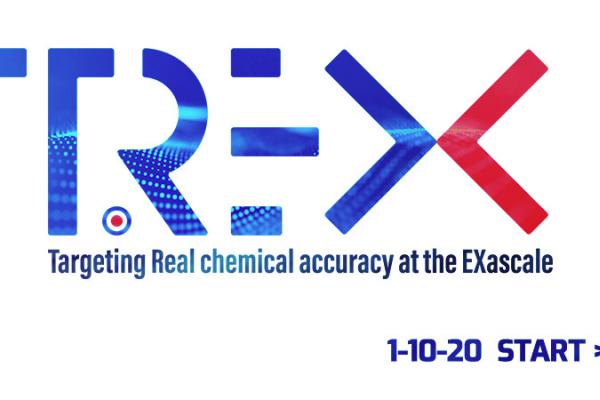Providing the research community with unique exascale computational power instruments to push quantum chemistry simulations a step further

Providing the research community with unique exascale computational power instruments to push quantum chemistry simulations a step further
Recently launched under the EU Horizon 2020 Research and Innovation Programme, the TREX is the new HPC Centre of Excellence for quantum chemistry. It tackles the great challenge of enhancing the tools available for the chemistry community to understand the fundamental properties of the matter.
1 October 2020
In recent years, the European Commission has seriously committed to the challenge, which also sees US and China competing, to build one of the first computers able to reach the computational power of 1 Exaflop (i.e. 1’000’000’000’000’000’000 or 1x1018 operations per second!), with the establishment of the EuroHPC initiative. This huge computational power will permit to perform simulations which are not affordable at the moment, challenge the limits of scalability of the applications but also enable ensemble simulations in a so-called high-throughput approach (for example, screening a huge number of drugs to quickly find the most effective ones). Naturally, such investments pose a series of questions, spamming from enabling massive parallelism to tackling with heterogeneous models of supercomputing architectures. In order to face these challenges, a huge and joint effort of domain scientists and computational experts is required. This rationale pushed the European Union to fund targeted Center of Excellences, each supporting a specific community. The European Center of Excellence in exascale computing TREX – Targeting Real chemical accuracy at the EXascale - falls under this remit and has officially started its activities on October 1st 2020.
TREX: Targeting Real Chemical accuracy at the EXascale
In quantum chemistry and materials science, it is really hard to achieve exascale scaling: a large amount of electronic structure applications is still struggling to get the most out of the computational power of current software, and a lot of effort is actually put in moving towards a class of problems able to take advantage of new machines and infrastructures in the exascale era. On the other hand, quantum Monte Carlo (QMC) approaches are intrinsically parallel and they are among the few methods in the field of quantum simulations that can fully exploit the massive parallelism of the upcoming exascale architectures. The marriage of these advanced methods with exascale will enable simulations at the nanoscale of unprecedented accuracy, targeting a fully consistent description of the quantum mechanical electron problem for very large systems.
The TREX Center of Excellence (CoE) aims at developing, promoting, and maintaining open source high-performance software solutions in the field of quantum chemistry, ready to take advantage of upcoming exascale architectures. TREX gathers European scientists, High Performance Computing (HPC) stakeholders, and SMEs working on quantum chemistry simulations of extreme accuracy in the framework of stochastic Quantum Monte Carlo (QMC) methods to develop software solutions that will greatly accelerate the diffusion in academia and industry of these unique computational instruments, which have so far largely been the privy of a specialized community.
This will permit to greatly enhance the tools available to the scientific community for the design of new materials and the understanding of the fundamental properties of matter.
About the Consortium
The TREX CoE project has officially been launched under the EU H2020-INFRAEDI-05-2020 plan funded by the European Commission GA 952165.
TREX Center of Excellence is a consortium of 12 partners, universities, research institutions, and SMEs from seven different European countries, namely:
- University of Twente (NL),
- Centre National de la Recherche Scientifique (Toulouse and Paris, FR),
- Scuola Internazionale Superiore di Studi Avanzati (Trieste, IT),
- CINECA (Bologna, IT),
- Jülich-Supercomputing Centre (DE),
- Max Planck Institute for Solid State Research in Stuttgart (DE),
- University of Versailles Saint Quentin-en-Yvelines (FR),
- Megware (DE),
- The Slovak University of Technology in Bratislava (SK),
- University of Vienna (AU),
- Lodz University of Technology (PL),
- TRUST-IT (IT).
The scientific core of the consortium is closely linked to two leading European HPC Centres, that is CINECA (IT) and Jülich-Supercomputing Centre (DE), and to Megware, an SME in the field of integration of HPC solutions. Finally, the partner TRUST-IT is an SME specialized in and responsible for the communication, stakeholder engagement, and outreach activities of TREX.


